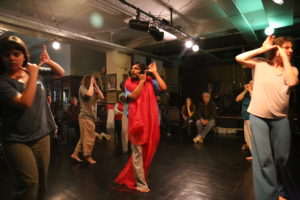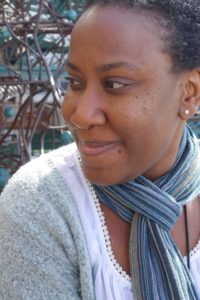Nancy Dietrich is a resident of Urbana who became an environmentalist because she likes to breathe clean air and drink clean water.
“Destruction of water resources and of forest catchments and aquifers is a form of terrorism. Denying poor people access to water by privatizing water distribution or polluting wells and rivers is also terrorism.”
~Vandana Shiva, Water Wars: Privatization, Pollution and Profit
Water is essential for all living things. It is also a convenient dumping ground for waste, and a commodity to be bought and sold. With these three themes in mind, the ensemble of Kate Insolia, Efadul Huq, Maddie Terlap, Madelyn Childress, Rosanne Brighton, Katie Fenton, Yu-Yun Hsieh and Latrelle Bright met once, sometimes twice, a week over the course of several months to learn, discuss, collaborate, create and then perform The Water Project, the latest theatrical performance directed by local theater maker Latrelle Bright. Katie Fenton served as dramaturge and Yu-Yun Hsieh as sound designer for the performance.
According to her website, latrellebright.com, “through research, devising and development, six local folk immersed themselves in water issues and created this performance from their findings and rumination, infusing sound, poetry, movement and song.” Phase one of the project consisted of research and learning: the group met to watch documentaries, discuss articles on water issues, and listen to invited guests. Phase two was the development phase. Using an age-old technique called “devised theater,” the ensemble began to collaborate on the piece itself: writing poetry & prose, creating movement pieces, and sharing their creations with the group for feedback, where the pieces were finessed and finalized by the entire ensemble. Phase three was rehearsal and performance.
Latrelle conceived of The Water Project as a way to raise awareness of the numerous water issues that confront our society today, to meet with like-minded people who care about these issues, and to find a way to merge the academic with the artistic. Latrelle studied musical theater at the Boston Conservatory, and has also studied at the International University in San Diego and Florida State University. She became interested in environmental issues as an undergraduate, but felt that there was a culture around the environmental movement that didn’t include people like her. This project has given her a way to meet and create with others who don’t necessarily fit into the usual environmental movement mold.
“When creating this piece, I felt like–this is community; this is democracy. In other theater performances I’ve been involved with, there is a hierarchy, which is typical in theater. Instead of top-down, this was side-by-side,” she reflects. This was one element that led to The Water Project debuting at the IMC. “I knew the IMC folk would appreciate it. If it would have been held at a more traditional theater, people would have expected traditional theater,” she says.
Efadul Huq, one of the performers in The Water Project, became interested in the project because it sounded fun and engaging. Efadul is a PhD student in the U of I’s Urban and Regional Planning program, and has a background in creative writing. In summarizing how the performance was created, he emphasized the importance of learning together, as well as how the piece was improvised over time.
“This was my first time doing devised theater,” he said. “Latrelle gave us exercises and prompts about the topic of water for us to think about. Then we created pieces and brought them back to the group, and the group would make comments and changes. It was different; more dynamic than regular theater.” Latrelle notes that devised theater is an old form of theater, and it comes naturally to us: children, for example, perform devised theater. “Even though you can get a degree in it, you don’t have to have a Master’s degree to be human,” she says. “Creating theater with people in community, with folks who don’t necessarily have training in theater,” was a powerful experience for Latrelle in directing and performing in this piece.
As the slogan goes, the personal is political. One of the goals of The Water Project was to think about, and get audiences to think about, how we access water and how water becomes a tool of domination depending on who controls access to it. “I wanted to work with Latrelle on this project because I knew it would be political; it wouldn’t just be ‘let’s celebrate how wonderful water is.’” Efadul says. And it did not disappoint in that way. Many examples of the political aspects of water are evident in the performance, including a piece called Resistance: Flint, MI (see sidebar).
Overall, upon reflecting on the question, “Why a piece about water?”, Latrelle responds, “because we don’t think about it enough. Many organizations are engaged in water issues. I hope we’ve planted another seed. There are so many issues to care about, but water is essential to everything.” And Efadul reflects, “there are so many things that divide us, but water connects us; it grounds us. [The Water Project] helps us reflect on our shared problems, and how it connects us all. Water is life.”
Latrelle states that there may be room in the piece for further development, specifically to focus on solutions; on ways that people are making access to water work for them. Perhaps a second act is in the works? Stay tuned.
For more information about Latrelle Bright and The Water Project, check out her website at: Latrellebright.com.
For sidebar/box:
Resistance: Flint, MI
Written by Katie Fenton
Performed by Kate Insolia
There was once, no
There is one now, a mother
The woman whose eye lashes were falling out?
Did you hear about her?
She took a jug of water, brown, all brown from her tap, to the city council.
The same water that was eating away machine parts in another part of town.
And guess what the officials told her?
It met the federal standards of 15 ppb.
And they toasted each other with crystal glasses full of water, crystal clear.
The world of alternative facts did not begin yesterday.
It was already here among the rulers everyone had trusted
Do you know how it feels to watch your 3-year-old always sick?
To not see him grow?
You start putting a gallon of water by the bathroom sink for brushing baby teeth.
You put crates of water all around kitchen, making a small home even smaller.
You send your children to shower at friends’ houses or take a bath with bottled water…
You do not know anymore what is caution and what is paranoia…
And the fact is, the water tested at 400 ppb when flushed.
When following the protocol set out by officials at a town hall.
And so sometimes resistance takes the shape of a 37-year-old staying up all night
teaching herself science of water testing while her children sleep.
Gathering information and gathering allies.
Experts in their field.
Who had never seen lead levels this high.
Levels so high the the water coming out of her faucet qualified as toxic waste.
Because the fact is, the water tested at 13,200 ppb when tested immediately.
Correctly.
Sometimes resistance means breaking down experimental protocols, timing of samples, instruments of control, and records of minerals to explain to yourself why one of your twins is smaller than the other one…
Sometimes resistance is constantly calling city officials, the EPA, the DEQ, the CLU, calling and calling until you find someone who will listen. Unleashing a chain of investigations that would last months. Years.
Sometimes resistance is staring through the night at the trail of injustices needled through generations, through our very DNA.


